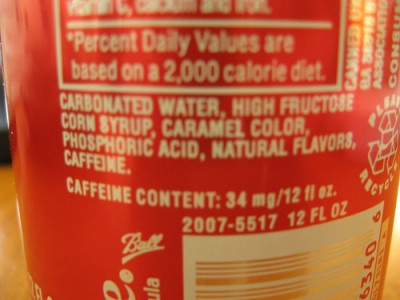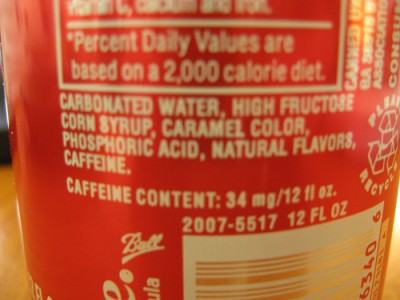
No refined sugar is good for you–but HFCS seems to be significantly worse. Photo: Nafmo.
The long-running, contentious debate over the dangers of high fructose corn syrup (HFCS) may be approaching a conclusive end — one not likely to please those sensitive souls over at the Corn Refiners Association.
While there has been extensive evidence that fructose is harmful to human health and associated with metabolic diseases like diabetes and liver problems, the fact is that plain old table sugar is itself 50 percent fructose. HFCS does have a higher concentration of fructose at 55 percent but it’s close enough to table sugar that most experts continue to dismiss claims that HFCS is on its own more dangerous. And certainly the claim that the introduction of HFCS in the ’80s directly led to the current obesity epidemic continues to be a highly controversial view.
A massive missing piece in this debate has been an absence of research directly comparing the effects of HFCS and table sugar (as opposed to pure fructose and glucose sugars, which is typically how the research has been conducted). Thanks to a group of researchers at Princeton, however, that missing piece may just have been found (via Science Daily):
A Princeton University research team has demonstrated that all sweeteners are not equal when it comes to weight gain: Rats with access to high-fructose corn syrup gained significantly more weight than those with access to table sugar, even when their overall caloric intake was the same.
In addition to causing significant weight gain in lab animals, long-term consumption of high-fructose corn syrup also led to abnormal increases in body fat, especially in the abdomen, and a rise in circulating blood fats called triglycerides. The researchers say the work sheds light on the factors contributing to obesity trends in the United States.
“Some people have claimed that high-fructose corn syrup is no different than other sweeteners when it comes to weight gain and obesity, but our results make it clear that this just isn’t true, at least under the conditions of our tests,” said psychology professor Bart Hoebel, who specializes in the neuroscience of appetite, weight and sugar addiction. “When rats are drinking high-fructose corn syrup at levels well below those in soda pop, they’re becoming obese — every single one, across the board. Even when rats are fed a high-fat diet, you don’t see this; they don’t all gain extra weight.” [Emphasis added.]
It may not seem like it at first blush, but this is blockbuster stuff. It appears to be a carefully conducted study–note Dr. Hoebel’s point that they fed the rats HFCS at “levels well below those in soda pop”–and one that should give anyone who has been dismissing previous evidence regarding HFCS serious pause (and not the kind that refreshes).
For all the talk about similarities between HFCS and sugar, there are differences. The researchers note that the fructose in HFCS, though present at only slightly higher levels than in table sugar, is chemically unbound and thus more freely available to the body. Perhaps this aspect of the sweetener is what is causing the now documented metabolic reactions. This revelation is a shoe that I have been predicting might drop, if only someone would get around to it.
Still, this study doesn’t change the fact that we still eat way too much sugar in all forms. But we now have at least some scientific evidence to suggest that without having pumped ourselves full of HFCS over the last 30 years, the American waistline (and its liver and blood chemistry) would look very very different. It also suggests that the food industry’s insistence in putting HFCS and other corn-based sweeteners in virtually every food product on supermarket shelves was deeply misguided.
As an added bonus, I’ll direct your attention to this recent Nightline segment on the dangers of fructose. It features UCSF Pediatric Endocrinologist Dr. Robert Lustig, whose [in]famous hour and a half lecture on fructose and its role in obesity has rather surprisingly and thanks to Youtube become a bit of an Internet sensation. And just to be clear, Lustig is no fan of fructose. In fact, he expresses his support to the somewhat skeptical Nightline correspondent for an age limit on soda purchases. Take a look.




